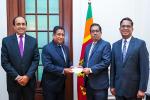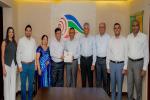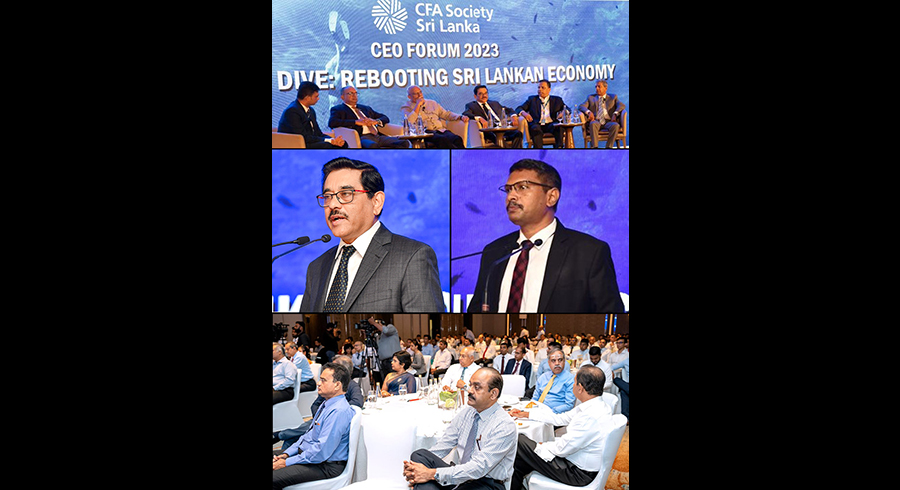The event was attended by regulators, senior government officials, business leaders, and CFA Charterholders.
The forum was aimed at fostering a constructive dialogue among regulators and business leaders, towards exploring the opportunities and challenges created through the recently announced domestic debt optimisation (DDO) programme, and focussing on the actions required from various stakeholders.
Delivering the welcome address, President of CFASSL Mr. Aruna Perera noted:
“The topic of rebooting the Sri Lankan economy resonates deeply with the CFA Society Sri Lanka, as we recognise the critical role that sustainable economic growth plays in the overall prosperity of our nation.
By organising this forum, we aim to not only address the challenges at hand but also emphasise the need for collaboration and strategic planning to unlock the immense potential our economy holds.”
Dr. Nandalal reaffirms CBSL’s commitment to establishing macroeconomic stability
The keynote address was delivered by Central Bank of Sri Lanka (CBSL) Governor Dr. Nandalal Weerasinghe, who focussed on the rationale for the DDO (impact on debt sustainability and financial stability), expected positive outcomes and expectations from the private sector.
Speaking of the need for a DDO programme, he stated that given the restructuring of external/foreign debt as well, it was imperative for the country to bear the responsibility of sharing the debt burden with external debtholders and implement domestic debt restructuring accordingly.
The Central Bank Governor commented:
“We’re seeking relief from external creditors who have invested their taxpayers’ and pensioners’ money, so our request must be credible, showing our commitment, and that we take all efforts to restore the situation [to normalcy].”
Furthermore, he affirmed CBSL’s commitment to establishing macroeconomic stability, fiscal consolidation, maintaining the stability of the banking system and assisting the government with necessary reforms, while working on the DDO programme.
The Central Bank Governor noted that with the DDO programme in place, government borrowings would decrease in the medium term, creating space for more private sector investments and impacting economic growth positively.
“In the past, the government absorbed a large amount of domestic resources, and as a result, there was a crowding out impact on the private sector.
Going forward, we expect there to be more resources from the local banking system for the private sector, facilitating it to grow faster and contribute to economic growth.
So far, the country has relied mainly on public sector investment growth. This needs to change going forward,” he asserted.
In addition, Dr. Weerasinghe referred to the Central Bank Act, which was passed recently, as a key positive for the country.
He noted that the Act solidifies CBSL’s independence, in addition to spelling out both its responsibilities and accountability to the government and the public in managing the financial system of the country and ensuring its stability.
DDO programme a key turning point for Sri Lanka, asserts industry leaders
The keynote speech was followed by a panel discussion featuring industry leaders including Dr. Weerasinghe, Mr. Jonathan Alles (Managing Director/Chief Executive Officer, HNB PLC), Mr. Suresh Shah (Chairman, SOE Reforms Unit of the Government of Sri Lanka), Mr. Vish Govindasamy (Group Managing Director, Sunshine Holdings Plc) and Mr. Maninda Wickramasinghe (Managing Director/CEO, Fitch Ratings Lanka Ltd.), and moderated by Mr. Senaka Kakiriwaragodage, CFA (Chairman, Employer Outreach Committee, CFASSL).
It involved a robust conversation related to a number of topics including the role of the banking industry, support for small and medium-sized enterprises (SMEs), restructuring of state-owned enterprises (SOEs), country credit ratings and the role of the private sector.
Mr. Jonathan Alles remarked that given the record-high impairments within the local banking system, it was prudent of the Central Bank to exclude the banking sector from the DDO programme.
He also noted that with interest rates on the decline, banks now have the opportunity to pass this benefit on to consumers.
In particular, he was of the view that it is time to support business and revive the SME sector.
Responding to a query on how banks can further assist SMEs, he commented that “firstly, we need to maintain the rebate, refinance and guarantee programs that are in place.
We must also continue to work with partners such as USAID, ADB, the other MLIs (multilateral institutions) and DFIs (development finance institutions) to provide financing.
We’re somewhat bullish that we can support them with better rates, and the necessary financial literacy and networks,” while adding that this should be coupled with accountability on the part of SMEs.
Mr. Maninda Wickramasinghe pointed out that the impact of the DDO programme announcement on the country’s credit ratings remained minimal due to the gradual rating downgrade over the past six years, causing the least amount of disruption.
As for the short to medium-term rating outlook, he confirmed that both external and domestic restructuring programmes need to be finalised, in order to take a new view on the rating.
“The highest rating Sri Lanka has received is a BB-, and we must aim to achieve much more. Countries in the region are at BBB+, with many of them having recovered from the Asian financial crisis,” Mr. Wickramasinghe added.
He believes that an upward rerating is inevitable, in the context of the International Monetary Fund (IMF) reform programme in place, although the time taken to achieve a B- rating at minimum depends on how diligently the nation sticks to its reform plans, and manages the domestic economy and external finances.
In addition, he highlighted the significant opportunity and responsibility of capital markets to seek new ways of creating capital for funding both public and private investments, with the DDO programme being in place.
Mr. Suresh Shah observed that seven key SOEs are currently up for restructuring, with the smaller, less complex entities likely being restructured by end 2023/early 2024, while the more complex entities (e.g. SriLankan Airlines, Sri Lanka Telecom and Sri Lanka Insurance Corporation) may take some additional time.
He revealed that the fundamental process for restructuring would remain the same for all entities concerned, with a stringent focus on transparency and carrying out due diligence on both the sell side and buy side.
“We need to follow a proper, credible, transparent process. I would tilt it to the side of transparency, credibility and proper process rather than speed.
In terms of numbers, we will see how we can get the best value for the country, not only in terms of a rupee or dollar value, but also investors for these entities.
We need credible investors who will help these entities grow, get the technology in and train the people,” he averred.
Mr. Vish Govindasamy spoke of structural changes within business operations and the importance of exports, noting that there has been an uptick in domestic manufacturing since the pandemic, although there is only so much room for import substitution.
He noted that raw materials are imported in most industries, and therefore, high working capital costs and exchange rate fluctuations have had a significant impact on businesses.
Whereas demand has dropped across the board, Mr. Govindasamy feels reduced interest rates would help jump-start consumption.
He opined: “For Sri Lanka’s export industry to go forward, we need serious policy stability. Ours is not the only country that’s exporting.
If you look around, there are enough countries people can source from the same as what they are sourcing from Sri Lanka.
Government also needs to enable digitisation of processes, doing away with large amounts of paperwork.”
Moreover, he believes that labour reforms are required to adapt to market changes, so as to retain and attract new talent to the various industries.
In their closing remarks, the panellists noted that business leaders, professionals and citizens alike should recognise this as being a key turning point for the country, and participate not only in rebooting the economy but also holding leaders to strong governance principles.
CFA Institute is the global association of investment professionals that sets the standard for professional excellence and credentials.
Founded in 2001, CFA Society Sri Lanka is a not-for-profit organisation supporting the professional development and advancement of CFA Charterholders and candidates in Sri Lanka.
Its membership of over 275 members consists of CEOs, CFOs, portfolio managers, equity analysts, banking professionals, investment advisors and other senior-ranking financial practitioners and over 300 candidates, mainly in the financial sector.






















